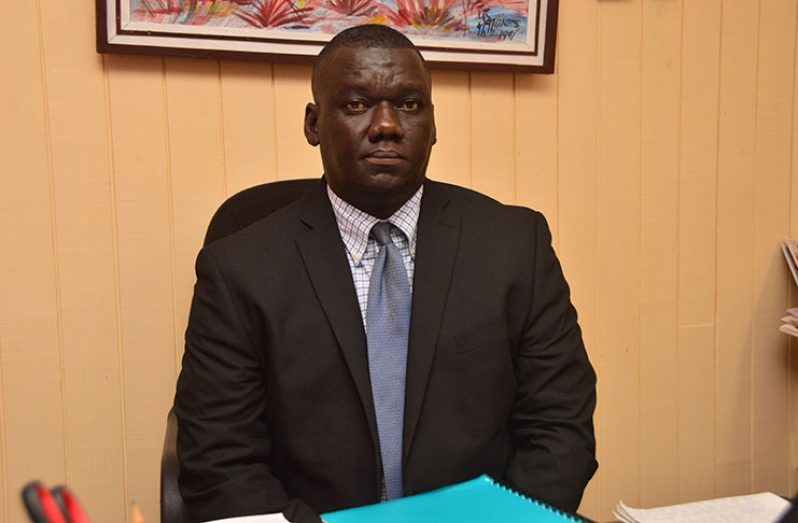…SG tells High Court order being sought by Ram runs counter to CCJ
…reiterates political actors must be guided by the Constitution
POINTING to the loopholes in the challenge to House-to-House Registration brought by Chartered Accountant Christopher Ram, Solicitor General, Nigel Hawke, said the applicant, through his attorney Anil Nandlall, is challenging the conduct of the exercise without challenging the order that created it.
To further compound the situation, Hawke said Ram is asking the High Court to grant orders, in which, the Caribbean Court of Justice (CCJ) has refrained from granting. The Solicitor General was among attorneys that made oral submissions on Monday in the High Court before Chief Justice Roxane George-Wiltshire, in the case Christopher Ram vs. the Chief Elections Officer, Commissioner of the National Registration, the Guyana Elections Commission and the Attorney General. Ram is challenging the constitutionality of the ongoing House-to-House Registration on the grounds that it is in violation of Article 106 (6) and Article 106 (7) of the Constitution, and the letter and spirit of the judgment and consequential orders of the CCJ in the consolidated appeals. Ultimately, he wants the Court to rule that the national registration exercise is illegal and of no effect.
But the Solicitor General, in representing the Attorney General, outlined the paradox in Ram’s case. He explained that while there is a challenge to the ongoing House-to-House Registration, there is no challenge to the order that paved way for the exercise to be conducted.
On June 11, then Chairman of GECOM, Justice (Ret’d) James Patterson issued an order for House-to-House Registration to commence on July 20, 2019 for a period of three months. This order, the Solicitor General reiterated, has not been challenged. “There has not been a challenge to the order made by the Elections Commission, embarking on House-to-House Registration,” he emphasised.
Added to that, Hawke told the Court that, in Ram’s case, there is no factual matrix connecting what is sought as against establishing where the breach lies.
As he continued to address the deficiencies in the case, the Solicitor General questioned what would be the consequential orders, assuming the court grants the declarations sought by Ram that the ongoing House-to-House Registration is in violation of the Constitution and the letter and spirit of the judgment and consequential orders of the CCJ. Answering the question himself, Hawke told the Court that Ram is seeking an order compelling GECOM to conduct elections. But he said the High Court must take note of the fact that Guyana’s final appellate court – the CCJ – in pronouncing on the matter, said it is not within its jurisdiction to set dates for elections.
“The court cannot grant orders in a vacuum,” the Solicitor General told the High Court.
Pointing to the deficiencies in the order being sought to compel the Chief Elections Officer to immediately take all steps and actions necessary to hold General and Regional Elections on or before September 18, 2019, the Solicitor General said in the construct of mandamus, an applicant must state what the authority failed to do in accordance with the law.
“When you look at six (section 1-VI of the FDA), if you strip six, forensically, you will see that they have not identified where exactly, which statutory provision GECOM has failed to satisfy. All they have said take steps but steps under which law, under what Act. The statutory body must fail to do something the law requires it to do,” the Solicitor General reasoned.
Overall, he maintained that the CCJ, in ruling on the matter, stated clearly that it cannot issue coercive orders or directives to the constitutional players. According to the CCJ, Guyana’s Constitution stipulates that only the President, the National Assembly and by extension GECOM can dictate the precise timing of the elections. President of the CCJ, Justice Adrian Saunders explained that it would not be correct for the Court, by the issuance of coercive orders or detailed directives, to instruct these bodies on how they must act. “It is not, for example, the role of the Court to establish a date on or by which the elections must be held, or to lay down timelines and deadlines that, in principle, are the preserve of political actors guided by constitutional imperatives. The Court must assume that these bodies and personages will exercise their responsibilities with integrity and in keeping with the unambiguous provisions of the Constitution bearing in mind that the no-confidence motion was validly passed as long ago as 21 December 2018,” he further explained.
Against that background, the Solicitor General told the Court that the order being sought is in direct collision with the ruling of the CCJ. Like the Court, he emphasized that the political actors must be guided by the Constitution.
“The court urged the political players to do their job; this is not for the court. Don’t come to the court when you have a job,” Hawke said while noting that the framers of the Constitution inserted a proviso within Article 106 (7), for the National Assembly, by a resolution supported by a two-thirds majority, to extend the time for elections, if the three-month timeframe is not sufficient. But that, he said, is still to be done.
The Chief Justice will hand down her decision in the matter on Wednesday, August 14, 2019 at 13:30hrs.



.jpg)








